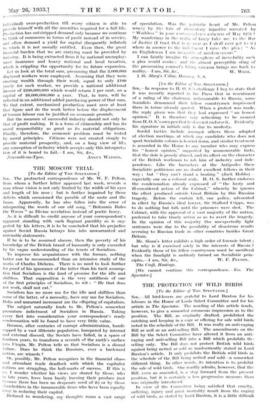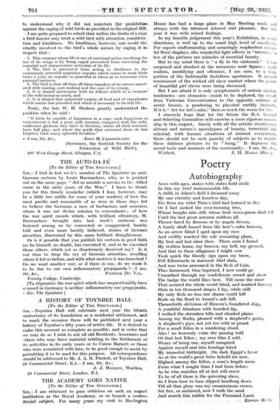THE PROTECTION OF WILD BIRDS
[To the Editor of TIIE SPECTATOR.]
Stn,—All bird-lovers are grateful to Lord Buxton for his labours in the House of Lords Select Committee and for his article in The Spectator. The wording of this article tends, however, to give a somewhat erroneous impression as to the position. The Bill, as originally drafted, prohibited the catching and keeping in a cage or offering for sale wild birds noted in the schedule of the Bill. It was really an anti-caging Bill as well as an anti-selling Bill. The .amendments on the Bill by the Select Committee have altered it from an anti- caging and anti-selling Bill into a Bill which prohibits the selling only. The Bill does not protect British wild birds against being netted or sold as inadvertently stated in Lord Buxton's article. It only prohibits the British wild birds in the schedule of the Bill being netted and sold—a somewhat different thing. In other words, its intention is to prohibit the sale of wild birds. One readily admits, however, that the Bill, even as amended, is a step forward from the present. position, but it is certainly a less progressive theasure than was originally introduced. In view of the Committee being satisfied that cruelty, suffering, injury and great mortality result from the caging Of wild birds, as stated by Lord Buxton, it is a little difficult to understand why it did not maintain the • prohibition;
against the caging of wild birds-as provided in the original Bill. . I am quite prepared to admit that within the limits of a cage a bird fancier may treat a wild bird with attention; considera- tion. and kindliness. No kindliness, -however, can- avoid the , cruelty: involved to the bird's whole nature .by caging .it in.
respect that : . — -
1. This creature whose life is one of continual action involving the use of its wings is by being caged prevented froni exercising the essential and characteristic activities of its life. . . .
2. The bird is prevented from acting in obedience to the enormously powerful migration impulse which comes to most birds. twice a year, an impulse so powerful at times as to overcome even parental instincts. 3. The bird is shut off from all those impulses of its nature associ- ated with mating, nest-making and the care of its young,- , 4. It is denied intercourse with its fellows which to a 'creature of the wild meaneso much, and 5. It is denied that unlimited variety of food and of experiences which nature has provided and which is necessary to its real life.
Truly, the late W. H. Hudson greatly understated the position when_ he said : . .
" If birds be capable of happiness in a. cage, such happiness or, contentment is but a poor, pale emotion compared with-the wild,. exuberant' gladness they have in freedom; where all their instincts have full play, and where the perils that surround them do but- brighten-their many splendid faculties." _
am, Sir, &c., JOHN M. Cuos-ni WAITE

















































 Previous page
Previous page